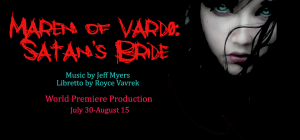There’s a new theater company in town, but it’s one that has been around for a long time. Center City Opera Theater has changed its name and its format, but is still determined to fulfill its mission of telling stories through song and bringing new works to Philadelphia audiences.
The new name, Vulcan Lyric, reflects the outcome of a several-month-long strategic planning process designed to answer questions about the future of the company. “Do we still need to exist, what’s the best way to deliver our product, and how can we compete in the current marketplace?” asked general director Andrew Kurtz, who founded the company in 1999 and still oversees its operations.
The outcome has several major components. First, they would only present new work never before seen in Philadelphia. While costs for commissioning new works themselves might be prohibitive, Kurtz, whose “deep passion for new works” led him to create the company in the first place, wants to make sure there is a place for developing and producing lesser known works. Second the works to be presented, will all be in English, but not limited to traditional opera. And third, they will present the works in a festival format during the summer when other theater in Philadelphia is essentially at a standstill.
The new name also reflects this vision. Vulcan, Kurtz says, is the Roman god of forging and creativity, “that sense of creating something out of nothing.” Lyric suggests the goal of telling stories through song. And if some associate the word Vulcan with STAR TREK, that’s fine with him. He wants “to boldly go” where no opera company has gone before.
The name also implies a scope that goes beyond traditional opera. “The people writing musicals in the forties,” he said, “thought they were creating American opera.” Gershwin’s Porgy and Bess, for example, was originally slated to be performed by the Metropolitan Opera Company even though it opened on Broadway. (It has since been performed by opera companies.) So whether it is called musical theater or opera, as long as it is “drama that is sung” it can be considered for the festival.
 This allows the company to select from a wide variety of unexpected works. This year they are producing two traditional operas—Maren of Vardo: Satan’s Bride (composer Jeff Myers; libretto Royce Vavrek) the story of a 12-year-old girl caught up in the witch trials in Norway, and La Higa de Rappaccini (Rappaccini’s daughter) (composer Daniel Catán, libretto Juan Tovar) based a short story by Nathaniel Hawthorne. One dramatic piece—Glory Denied (composer Tom Cipullo) based on the book by Tom Philpott about an American POW during the Vietnam War. And the rock musical Heathers (music, lyrics, and book by Laurence O’Keefe and Kevin Murphy) based on the 1988 film Heathers.
This allows the company to select from a wide variety of unexpected works. This year they are producing two traditional operas—Maren of Vardo: Satan’s Bride (composer Jeff Myers; libretto Royce Vavrek) the story of a 12-year-old girl caught up in the witch trials in Norway, and La Higa de Rappaccini (Rappaccini’s daughter) (composer Daniel Catán, libretto Juan Tovar) based a short story by Nathaniel Hawthorne. One dramatic piece—Glory Denied (composer Tom Cipullo) based on the book by Tom Philpott about an American POW during the Vietnam War. And the rock musical Heathers (music, lyrics, and book by Laurence O’Keefe and Kevin Murphy) based on the 1988 film Heathers.
The festival format has several advantages for the company. Instead of three or four performances that last for just one weekend, the three weekends in a row allow for word of mouth to draw in audiences. Promotion budgets don’t have to be split, theater rental is condensed, and the company gets to organize its time and focus during the year, spending the fall/winter on their school programs and development workshops, and spring/summer on the festival.
This format also will help build audiences. Opera, Kurtz points out, “has a built in tourism audience.” With 146 professional opera companies across the country, based on membership in Opera America, only fifteen are known for doing festivals. “Now sixteen,” he says including Vulcan Lyric’s. Those festivals, he says, become destinations, “with about a third of their audiences coming from out of town.” That’s what he would like to see happen with Vulcan Lyric.
In addition Kurtz wants to maintain Vulcan Lyric as a place for developing the talent of the next generation of artists, and providing a lab for that to happen. Center City Opera Theater was known as a development company, working on up to six different projects at a time. Kurtz wants to continue that process and not having to split his energy between production and development throughout the year will help.
Kurtz is also excited by Opera Philadelphia’s commitment to commissioning new works as well. “The more new work there is in development,” he says, the more appetite there is for new works.” And, he adds, Opera Philadelphia with a broader reach, can do more “heaving lifting” in terms of audience development.
This year’s festival takes place at the Prince Theater and makes use of the main theater and the black box upstairs. There will be pre-show discussions for the operas and a post-show talk back after GLORY DENIED.
VULCAN LYRIC FESTIVAL July 30-August 16, 2015 at the Prince Theater [1412 Chestnut Stree] vulcanlyric.org.
